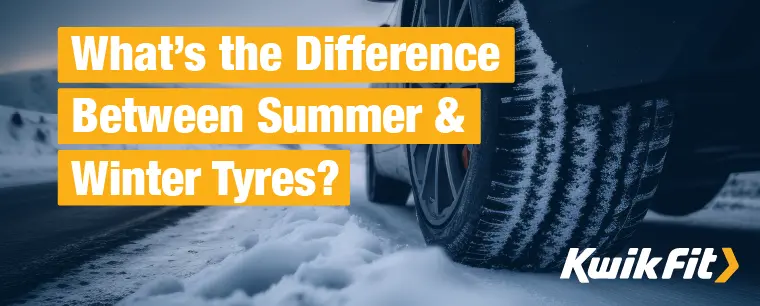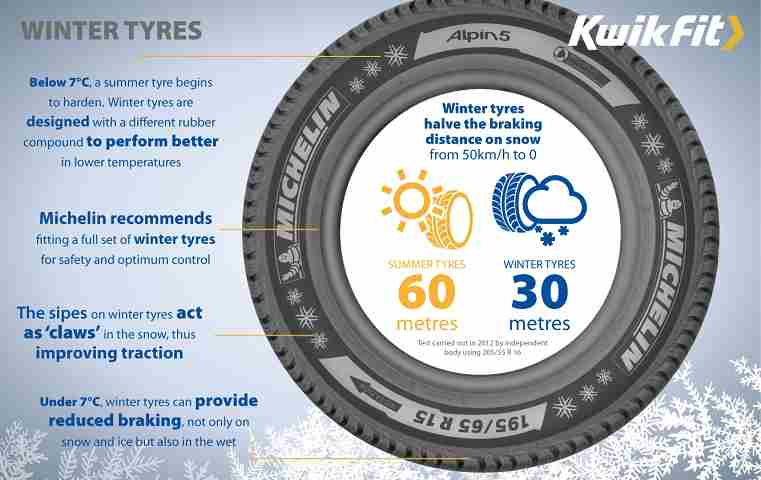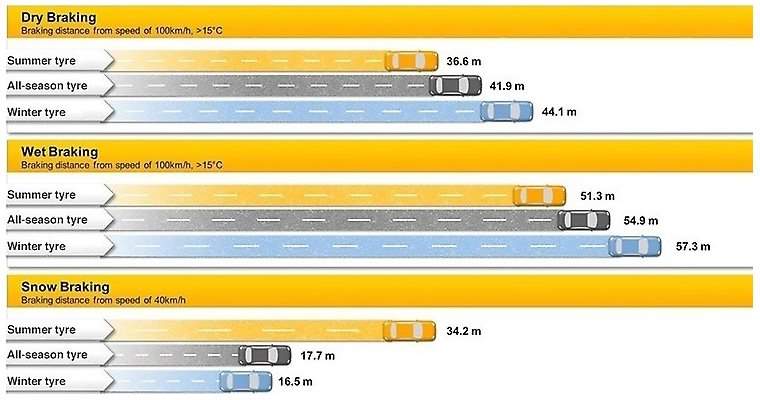What’s the Difference Between Summer & Winter Tyres?
Jack Dreyer | Monday 26th June 2023 11:00am

Here in the UK, we’re not too accustomed to swapping between summer & winter tyres – likely because, in most parts of the UK, the weather doesn’t get as bitterly cold and snowy as it does in many parts of Northern Europe. In fact, many Northern European countries legally require drivers (including tourists) to swap to winter tyres during specific months.
Summer and winter tyres are developed to work best in the normal conditions of summer and winter. That is, summer tyres work best in dry weather, and winter tyres work best in the wet & snow. But how? And what exactly sets them apart? Let’s find out.
The tread pattern is different
To the casual observer, summer and winter tyres may look similar, but there are in fact significant differences. At a glance, you can tell if it’s a winter tyre by looking for a snowflake symbol on the sidewall – but when you look beyond the sidewall, the contrast will become even clearer.
One of the main differences between summer and winter tyres lies in the tread pattern. The primary aim of tread patterns is to most effectively balance the requirements of channelling water away from the tyre while also keeping enough rubber in contact with the ground to actually maintain traction. This is crucial for both stopping and pulling away effectively, and can also reduce the risk of aquaplaning.
When you look at the two tyres below, you can see that the winter tyre on the right has considerably more sipes than the summer tyre on the left. Those are the thin grooves that exist to channel water away from the tyres. The summer tyres on the left have considerably fewer sipes because there’s typically a lot less wet weather during the summer months.
They’re made from different rubber compounds
Summer and winter tyres are made from different combinations of compounds engineered specifically for their respective seasons. This is crucial in order to account for the way rubber behaves differently at different temperatures.
The key tipping point between summer & winter tyres is at 7ºC and below.
As is very clear with water, the colder a material gets, the more it contracts and hardens. This is true of mostly any material (even metal) but with many organic materials, such as rubber, it’s much more pronounced. An improperly designed tyre, therefore, can harden so much in cold weather that it loses all elasticity and splits. Or, conversely, can soften so much during hot weather that it wears off in no time.
Premium tyre manufacturers invest a large amount of time into research and development to improve their tyre designs and compounds — all in the service of road safety and tyre performance. This results in specific seasonal tyres that excel in their particular seasons.

Tyre design affects stopping distances
Crucially, the differences in tread design and compound mixture affect how well a tyre is able to grip a road in particular conditions. This quite dramatically affects stopping distance.

As you can see, at 40km/h, a car with winter tyres would stop almost 20 metres shorter than a car fitted with summer tyres. That’s a significant difference between a serious accident and a minor inconvenience.
Even in wet braking below 7ºC, there’s a noticeably better stopping distance compared to summer tyres.*
Winter tyres are not snow tyres
An important note is that winter tyres are not necessarily just snow tyres. They should perhaps be better called “Cold-weather Tyres” because their use is most effective below 7ºC, whether in dry, wet, or snowy & icy conditions.
Winter tyres increase performance of rear-wheel drive vehicles in wet & icy conditions
Owners of RWD cars will know all too well that even the most high performance car can become a fishtailing nightmare when it snows.
The main reasons why front wheel drive cars do not suffer in the same way is because of the added weight of the engine pushing down on the front axle. Added weight on the drive wheels means added grip. In addition, rear wheel drive vehicles effectively push the car forward rather than pull it. This pushing motion is far less controlled on slippery surfaces and can result in the vehicle skidding to one side.
Winter tyres can make a huge difference and at a recent Pirelli winter driving experience we easily managed to drive a BMW 3 Series 320d up the incline of an indoor ski slope once it was fitted with Pirelli’s Sottozero 3 winter tyres.
4x4s, SUVs, crossovers, vans, and light trucks
4x4s, SUVs, and Crossovers typically provide drivers with better traction in snow and ice, so many people simply assume that they don’t require winter tyres. If you drive one of these vehicles with summer tyres fitted you would certainly fare better than most other drivers when it comes to getting your vehicle started, and driving in a straight line. The added traction these vehicles offer might also help you get up an incline or two.
But when it comes to cornering – particularly when braking – that advantage ends. Why? Because summer tyres struggle to grip the cold surface as well as winter tyres. As such, switching to winter tyres is a much safer choice, even with 4x4, SUV, and Crossover vehicles.
As for light commercial vehicles, productivity is an important factor to these drivers. If your business depends on mobility, then winter tyres will help keep your business on the road during the colder months.
Tyre storage for summer and winter
One issue with swapping your tyres seasonally is that you usually need somewhere to store them while they’re not in use. This isn’t a problem if you have somewhere to store them at home, but many people do not. So we actually offer a ‘Tyre Hotel’ service where we’ll look after them until it’s time to swap back.
All-season tyres
One way to get around the potential hassle of swapping your tyres is to opt for all-season tyres. These are specifically formulated to work well in all weather, but won’t have as good performance as specialist tyres in very hot or very cold weather.
Trust the experts, trust Kwik Fit
Considering your tyres are the only contact between you and the road, make sure your tyres are quality, safe, and expertly installed. Trust the experts, trust Kwik Fit.
Get in touch with your local Kwik Fit centre to book a tyre replacement.
Any facts, figures and prices shown in our blog articles are correct at time of publication.
Featured Articles
Is it Illegal to Drive With One Headlight?
Saturday 19th July 2025
Wondering if it’s illegal to drive with one headlight? Learn about the safety risks and penalties of illegal blown bulbs and why you should fix them promptly.
Air Con in EVs & Hybrids: Experts Answer Your Questions
Monday 30th June 2025
Does air con drain EV batteries? Can you use the air con while charging an electric car? Find out the answers to these questions & more from Kwik Fit’s experts.
Why Is Your Car Making a Noise? Fixes & Tips
Friday 13th June 2025
When your car starts making unexpected noises, it can certainly be quite disconcerting; it may be nothing to worry about, but here’s what you need to know.









